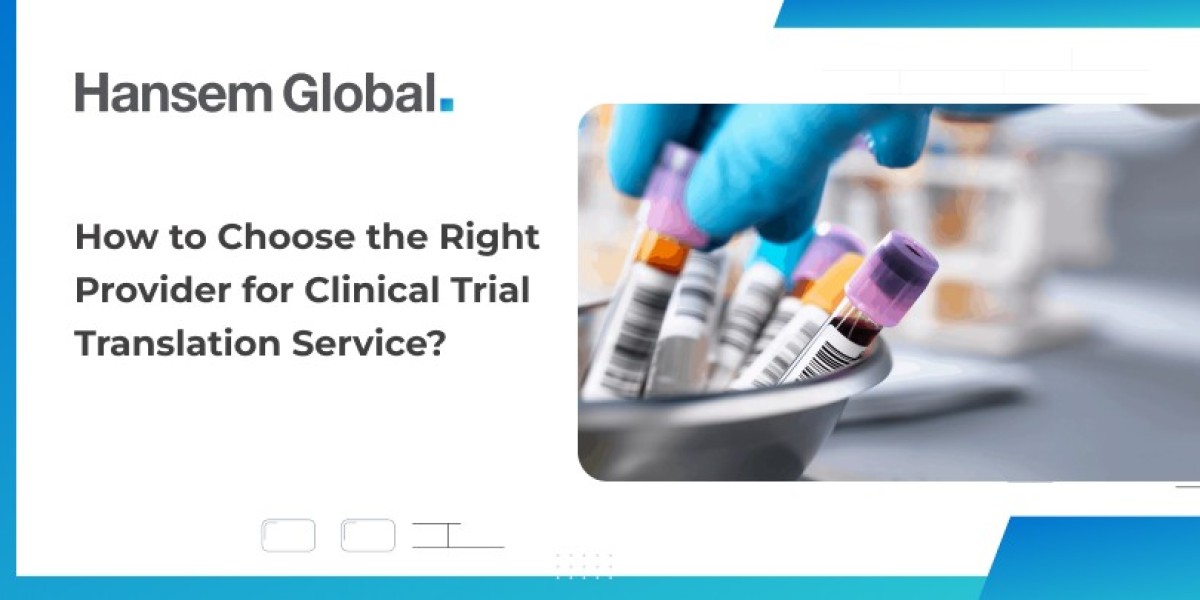Selecting a best-in-class clinical trial translation services provider is one of the important milestones towards ensuring success in medical research and patient safety. Translation has become more important as clinical trials have grown globally. Erroneous translation may lead to a delay in regulatory approval or have an impact on patient welfare.
Therefore, it is important to comprehend the nuances when selecting a translation service provider. Below, you will learn all the key factors to make a sensible decision while choosing a professional translator to maintain transparent, compliant, and quality clinical trial documentation for your business.
Understanding the Importance of Clinical Trial Translation
Effective communication is critical when you are involved with clinical trials. Regardless of that fact, clinical trial translation services are at the front and center when it comes to all documentation and communication between participants, researchers (or CROs), and regulatory bodies. This is also vital as misinterpretations can affect patient safety and compliance and may consequently slow or halt clinical research efforts.
How to Choose Ideal Clinical Trial Translation Service
These are the prime factors you must consider to find the best translation service for clinical trial documents:
1. Evaluate the Translator's Experience
You must take into account the translator's experience in clinical trial translation. Look for a company with in-house translators specialized in medical and clinical terminology. Knowledge of these specific needs and the quirks of clinical trials will allow the subtitler to provide translations as close as possible to the original meaning. A good translator, indeed, does not only understand the language but also the clinical concepts of translation.
2. Look for ISO Quality Certifications
Check if the translation provider has ISO quality certifications. Certifications for translation service providers, such as ISO 17100 (specifically for TSPs) or even the more general quality management standard of ISO 9001, tell you that the provider has high standards in terms of how they run their translation services. This is necessary to guarantee the quality and application of best practices in clinical trial translations.
3. Assess Translation Quality Procedures
Quality could mean different things to different translation service providers. Study the in-house process of how your prospective partners handle quality translation deals with their data. Your chosen provider should always have clear processes and best practices in place (structural revision, proofreading, quality evaluation techniques) that ensure no haphazard steps are taken when promoting translation accuracy. Knowing how they ensure quality control will give you confidence that your clinical trial documentation will be translated accurately and consistently every time.
4. Ensure Linguistic Validation Capabilities
It is a process of translating clinical outcome assessments (COAs) to ensure they are linguistically and culturally equivalent to the source language. Ask whether the language service providers do linguistic validation (evaluation of a given translation) for every language and how frequently it is done. This usually requires two or more translators and includes several rounds of review to ensure the translations read naturally for the target audience while retaining the original meaning.
One of the great service providers in the language service business is Hansem Global. They use the best AI technologies combined with MTPE specialists' supervision for accurate translations. In fact, they specialize in catering to companies conducting clinical research in need of translation services. Moreover, the company compiles the translated information with international standards to provide correct and culturally sensitive clinical research papers in multiple languages.
5. Confidentiality and Patient Privacy
Patient privacy is a matter of confidentiality. Your translation provider should comply with HIPAA Regulations and have NDAs (Non-Disclosure Agreements) for translators and project managers. They should have immutable processes for data handling and regular reviews to ensure compliance with confidentiality standards.
6. Confirm Understanding of Local Regulations
While conducting clinical trials across multiple countries, selecting a translation provider versed in local regulations and requirements is essential. This includes the language and knowledge of the cultural subtleties and legal structures for clinical trials in various regions. You must ensure that your service provider keeps up with these changes actively to ensure compliance and efficiency.
7. Analyze Their Technological Capabilities
Today's clinical environment demands innovation-driven tools to accelerate the translation process along with efficiency. Check whether the translation provider applies sophisticated translation tools, including AI adaptation for faster translation, terminology management software, translation memories, and project management systems. These tools make your clinical trial translation process not only more efficient but also provide a sense of consistency throughout all translated documents.
8. Seek Recommendations and Reviews
Ensure to ask about the translation provider from colleagues or other professionals in the field before finalizing your choice. Outside reviews can offer key information on the reliability of the provider and their standard for translation services. Track feedback patterns from their users to understand the reputation of the service provider within the clinical research community.
9. Discuss Pricing Fairly
Yes, the cost is always a determining factor, yet doing so should not be at the expense of quality. Connect with different translation providers and compare their pricing structures to get the best insights. Check that they specify what is included in their prices and look out for rates that are unnervingly low because cheap often equates to a sacrifice on quality or accreditations. Ensure there should be a balance between fair pricing and good qualifications.
10. Assess Responsiveness to Needs
Clinical trials often require fast responses on tight deadlines. Check the flexibility of your provider when they respond to urgent requests. Test them on their ability to turn around work quickly, particularly with respect to documents that are pivotal to early-stage clinical trials.
Make the Right Choice by Hiring Hansem Global
Choosing the right provider for clinical trial translation services can greatly influence the success of your clinical research projects. By focusing on the translator's experience, certifications, quality procedures, confidentiality measures, and technological capabilities, you can ensure that your outcomes will be reliable and compliant. High-quality clinical trial translation not only mitigates risks but also enhances patient safety and regulatory adherence, setting the foundation for successful clinical advancements.
FAQs
1. What are the typical document types of clinical trial translation?
The myriad of document types that are needed in the clinical trial process involve consent forms, informed consent forms, patient information sheets, adverse event reporting forms, and investigator brochures. Of these, the consent form is most important because it describes the risks and benefits of the treatment to ensure that patients understand what they are about to participate in.
2. The clinical trial translation requires localization, but why is it so important?
Localization is not just a translation but altering the content for a new audience and culture1. This is important in clinical trials as study material read and understood by participants means different things depending on their subculture. Using language in which target readers are comfortable encourages feelings of ease in patients who are uncomfortable expressing sentiment.
3. In what ways will AI technology make it easier to translate clinical trials?
There are many ways that AI technology can boost speed and precision regarding the translation from clinical trials. The company uses neural machine translation (NMT) to produce a quick-to-translate mountain of text, which human interpreters transform into textual legitimacy and cultural idiosyncrasy. Together, this allows for fast translations matching our quality and cultural appropriateness standards.







